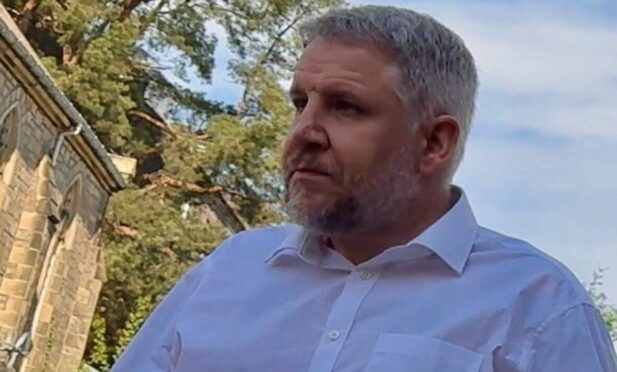A chief fire officer’s undiagnosed depression could have “affected his decision-making” at the time he placed a £500 winning bid for one of his own brigade’s Land Rovers, a court has heard.
Stewart Edgar is accused of fraudulently purchasing the vehicle, which was being sold off after reaching the end of its service life, using a third-party company to put the bid in on his behalf.
Birmingham Crown Court has heard an allegation Edgar also dishonestly turned down a rival £8,250 bid for the 17-year-old Defender vehicle, after telling a colleague he had always wanted a red Land Rover for his daughter’s wedding.
Prosecutors have claimed 53-year-old Edgar, the former head of Gloucestershire Fire and Rescue, abused his £120,000-a-year post to commit the fraud in 2018.
The Arbroath-born former area manager of Tayside Fire and Rescue was the lead fire officer dealing with fire and rescue service planning for the G8 Summit at Gleneagles.
Condition was undiagnosed
Edgar previously told jurors he was now on “a lot of medication” for mental health issues connected to his long service as a firefighter, adding he had seen “hundreds of dead bodies” and suffered a “breakdown”.
Jurors heard he had started to suffer “flashbacks” within “18 to 24 months” of taking on the leading role at the Gloucestershire brigade, which he joined in 2014, and was “not in the right frame of mind” for the job at the time the sale happened.
However, at the time he was not diagnosed and had not sought any specialist medical help, the court heard.
On Wednesday, defence expert and consultant psychiatrist Dr Tom Clark, who assessed Edgar face-to-face in July 2021, said he ultimately diagnosed a depressive episode, adding the illness dated to before the Land Rover sale, in his view.
Dr Clark said Edgar had told of becoming symptomatic from 2015, when he had problems with impotence, and that he had also increasingly struggled at work.
The court previously heard evidence that as late as June 2018, Edgar had told colleagues he still “enjoyed” his job and received approaches from both Scottish Fire and Rescue Service and Greater Manchester Fire and Rescue Service to lead those brigades.
The psychiatrist said: “He found at work he was beginning to struggle, for example, he began to shut himself in his office, he would lock his door and sit at his desk doing nothing, feeling sad and sometimes feeling tearful.”
‘A feeling of shame’
Dr Clark said Edgar had explained his mental health “had deteriorated since he left his job” and “got worse” after he resigned in 2018, after the vehicle sale came to light.
He added: “He felt worse because he had a feeling of shame at the situation he had got himself into and having lost his job and his role in life.”
The court heard Edgar’s medical records showed he first sought mental health treatment in August 2018, after leaving his role.
Dr Clark’s assessment was based on what Edgar himself and, to a lesser extent, his wife had told the doctor, along with his records.
“I am satisfied, clinically, that began to develop – as he said it did – sometime in 2016,” Dr Clark said.
Asked if, in his opinion, Edgar had been depressed at the time of the Land Rover sale, the doctor said: “I am entirely satisfied about that – I don’t have any significant doubts in that regard.”
Bad decisions
Taking the doctor through his report on Edgar’s mental health, Alistair Webster QC, defending, asked Dr Clark about his conclusion it was “plausible his mental illness at the time contributed to his decision-making” around the period of the alleged Land Rover fraud.
Dr Clark replied: “Yes, I suppose so.
“It must have affected his decision-making because it would have been affecting all of his thinking behaviours – the question is exactly how much.”
Robin Shellard, the Crown’s barrister, then asked Dr Clark: “People who suffer from depression don’t necessarily always make bad decisions do they?”
Dr Clark replied: “Oh no, of course not.”
Jurors have previously heard Edgar sent a text message in April 2018 to a contact at a third-party firm, which later placed the winning Land Rover bid on his behalf, saying the arrangement would be “cleaner” and stop any “silly FOI stuff”.
The ex-fire chief later told jurors he “didn’t think it was wrong” at the time to place a winning bid in an auction he was running.
Edgar, of Braehead Drive, Carnoustie, Angus, denies a single count of fraud by abuse of position alleged to have been committed between April 1 and May 1 2018.










